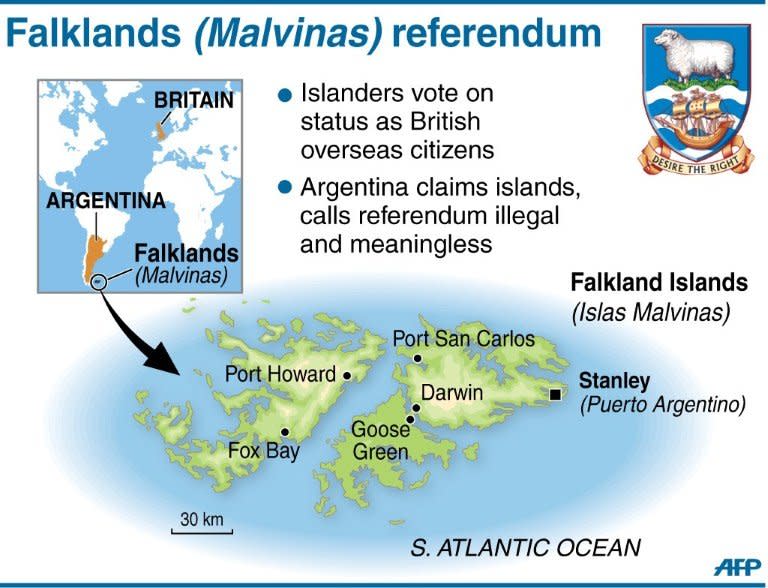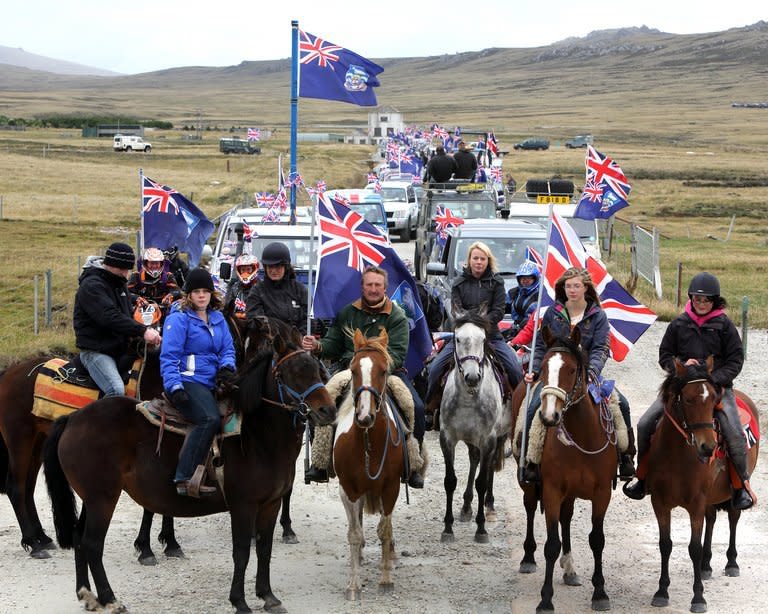Britain tells Argentina to respect Falklands vote
British Prime Minister David Cameron on Tuesday urged Argentina to respect the wishes of the Falkland Islanders after they voted overwhelmingly in a referendum to remain a British territory. A near unanimous 99.8 percent of the 1,672 eligible voters in the disputed South Atlantic archipelago voted "yes", according to official results, with a 92 percent turnout. Only three of the 1,517 valid ballots were cast against staying an internally self-governing British territory. The islanders organised the vote in response to increasingly bellicose sovereignty demands by Argentine President Cristina Kirchner. Her government dismissed the referendum as meaningless and said it would not affect its claims on the Falklands, which it failed to seize back from Britain in a brief but bloody war in 1982. The announcement of the result overnight Monday sparked jubilation in the islands' tiny capital Stanley, and Cameron said he was "over the moon" at the outcome. "The Falkland Islanders couldn't have spoken more clearly. They want to remain British and that view should be respected by everybody, including by Argentina," he said. Cameron, who later telephoned the chairman of the islands' legislative assembly to congratulate him on the result, also warned against any military action by Argentina. "People should know we will always be there to defend them," he said. Barry Elsby, a member of the legislative assembly, told AFP from Stanley as the numbers came in that the result "sends a message around the world." "There are hundreds of people outside the cathedral, celebrating, singing and waving flags." International observers from Canada, Chile, Mexico, New Zealand, Paraguay, the United States and Uruguay monitored the referendum on Sunday and Monday and declared it "free and fair". Argentina however insisted that the vote in the islands it calls "Las Malvinas" was meaningless. Alicia Castro, Argentina's ambassador to London, said it was a "ploy" to detract from the "weakness" of Britain's claims. "It's a very predictable result, because the current inhabitants of the Malvinas are British. But the territory in which they live is not," she said. She earlier dismissed the vote as "a manoeuvre with no legal value, which has neither been convened nor supervised by the United Nations." Kirchner was not expected to comment on the result, an Argentine foreign ministry source told AFP. The referendum had sparked huge enthusiasm among the Falkland Islands' 2,563 permanent residents, four-fifths of whom live in Stanley, with its typically British pubs and red telephone boxes. The remaining several hundred islanders are scattered in isolated sheep farms and tiny settlements across the bleakly picturesque landscape outside the town, known as "Camp". Even out there, homes and shops were festooned with posters and flags, both Britain's Union Jack and the deep blue Falklands standard, which features the Union Jack and the islands' crest -- a sheep, a wooden ship and the motto "Desire the Right". London has held the Falklands since 1833 but Buenos Aires says this is an occupation and the British residents are colonial implants with no right to self-determination. It says the United Nations had issued 40 resolutions calling on Buenos Aires and London to negotiate over sovereignty. However, London says there will be no talks unless the Falklanders wish it. Tensions between the two sides have increased in recent years against a backdrop of the discovery of oil reserves in the waters off the Falklands, the 30th anniversary of the 1982 war and domestic political difficulties facing both governments. Falklanders hope the referendum result will arm them with an unambiguous message to take to other capitals when pressing their case for acceptance on the international stage. The United States, for example, has studiously avoided taking sides on the issue despite its close ties with Britain. But international reaction to the vote was almost non-existent. Professor George Philip, a Latin America expert at the London School of Economics, told AFP the vote "offers a certain psychological relief" to the islanders from Kirchner's territorial claims. But he added: "In international terms, it's a bit of a non-event. I think people will hope it goes away."




